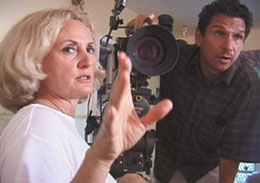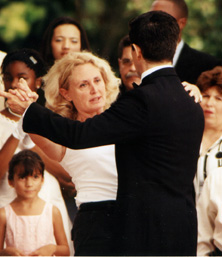|
PROBLEMS AND SOLUTIONS
Accent's sponsored productions for non-profit organizations, government
agencies, corporations, and international organizations often address
problems and suggest solutions. Media productions can rarely solve problems
on their own. But television, radio, and print elements of a campaign do
have enormous power to reach large numbers of viewers and listeners with
important messages, make people think, and stir them to action, provided
that the messages are communicated in a way suited to television and radio.
Our productions are works of visual storytelling -- very different from
lectures, scholarly articles, informational websites, or brochures. Our
programs show people facing a problem in a concrete way. They tie
information and ideas to emotions, based on the assumption that people
remember and act on information and ideas only when they have been moved by
what they see.
How can Medicare encourage seniors to practice preventive medicine?
In
talking with seniors, Accent producers Cecilia Domeyko and Jack Jorgens
found that the love of grandchildren is a powerful motive for them to take
better care of their health. They wrote and produced a charming PSA called "The Birthday Present", where the affection of a cute granddaughter stirs a
grandfather to go to the doctor for a checkup.
What can the Catholic Church do to keep young Hispanic families from
drifting away from the Church?
Accent created "La familia unida, esperanza
en la vida" ("A united family means hope for the future"), a five-year
campaign addressing forces which threaten young families, including domestic
violence, substance abuse, lack of communication between parents and
children, gang violence, lack of forgiveness, cultural prejudice, and AIDS.
Programmers have called this award-winning series one of the most powerful
Spanish-language campaigns they have ever seen.
What can Medicaid do to let low-income families know that the loss of
welfare does not necessarily mean the loss of Medicaid?"
Accent launched "You Don't Have to be on Welfare to Get Medicaid", a bilingual TV and radio
PSA campaign targeted at Medicaid agencies in 36 participating states, where
actors representing mothers and young couples talk about how medical
assistance has helped them with glasses for their child or prenatal care for
their unborn child. Regional Medicaid directors were urged to personally
appeal to local radio and TV stations to air them in their communities. The
result was seventy million impressions in the first three months.
How can the World Bank and USAID encourage policy makers and educators in
other developing countries learn from the educational reforms of Uganda?
Producer Cecilia Domeyko developed a story about an experienced tutor Mr.
Kaate who over four weeks visits his district schools, talks to students,
makes suggestions to teachers, brings new teacher materials, and holds
parent meetings to stress the importance of their participation. He is a
wonderful role model, and he embodies everything the educational reform is
trying to accomplish. The result? The program aired on more than 90 TV
stations and was seen by hundreds of policy makers and education officials
around the world.
What can Medicare do to help women understand the importance of being tested
for HIV?
Accent's crew went to four cities nationwide to talk with women
who have courageously faced the trauma of testing positive during pregnancy
and giving birth to an HIV positive child.
How can the Ford Foundation and Miranda Foundations encourage Latin American
countries to set up private funding for the arts?
Accent went to Cuba and
taped the nation's most talented musicians, dancers, actors, painters, and
sculptors - encouraging corporate sponsorship and the creation of
foundations by showing the beauty and power of the arts so vital to the
culture of any nation.
How can the National Eye Institute educate the public about the dangers of
eye disease for diabetics?
During pre-production research, Accent
discovered that Salsa star Celia Cruz's husband has diabetes. In a VNR and
PSA released in radio and TV, they talk about the importance of eye exams.
What can the American Bar Association and AARP do to make Hispanic seniors
more aware of their legal rights?
Accent adapted a series of
English-language educational Public Service Announcements where the popular
actress Rita Moreno spells them out.
How can Medicare help nursing homes recruit and retain overworked and
underpaid Nursing Assistants in a tight job market?
Accent produced an
educational video letting nursing assistants express their gratification
with helping people, and illustrate the growing movement to offer better
working conditions, training, and increased pay. The program includes
spokespersons from everyone involved with nursing homes, including resident
and their families, nursing assistants, ombudsmen, representatives of
for-profit and non-profit nursing homes, government agencies, and consumer
groups.
How can AARP reach out to the Hispanic community as successfully as it has
with other senior groups?
Accent assisted in creating a novella style
comic book about managing family finances as the beginning of a pilot
project which may include TV and radio PSAs, news releases, and dramatic
vignettes in the telenovela style.
What can the World Bank to mitigate the devastating impact of large
development projects (dams, roads) on individuals, families, and local
industries?
Accent produced a program to dramatize the problems created by
forcibly moving people from their ancestral lands, and clarifying for
development partners new requirements for handling forced resettlement --
not merely compensation, but training, community building, and continuing
support after the move has taken place.
|









|

